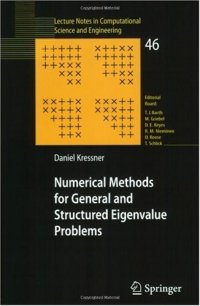
Ebook: Numerical Methods for General and Structured Eigenvalue Problems
Author: Daniel Kressner (auth.)
- Genre: Mathematics // Computational Mathematics
- Tags: Computational Mathematics and Numerical Analysis, Systems Theory Control, Computational Science and Engineering
- Series: Lecture Notes in Computational Science and Engineering 46
- Year: 2005
- Publisher: Springer-Verlag Berlin Heidelberg
- City: Berlin; New York
- Edition: 1
- Language: English
- pdf
The purpose of this book is to describe recent developments in solving eig- value problems, in particular with respect to the QR and QZ algorithms as well as structured matrices. Outline Mathematically speaking, the eigenvalues of a square matrix A are the roots of its characteristic polynomial det(A??I). An invariant subspace is a linear subspace that stays invariant under the action of A. In realistic applications, it usually takes a long process of simpli?cations, linearizations and discreti- tions before one comes up with the problem of computing the eigenvalues of a matrix. In some cases, the eigenvalues have an intrinsic meaning, e.g., for the expected long-time behavior of a dynamical system; in others they are just meaningless intermediate values of a computational method. The same applies to invariant subspaces, which for example can describe sets of initial states for which a dynamical system produces exponentially decaying states. Computing eigenvalues has a long history, dating back to at least 1846 when Jacobi [172] wrote his famous paper on solving symmetric eigenvalue problems. Detailed historical accounts of this subject can be found in two papers by Golub and van der Vorst [140, 327].
This book is about computing eigenvalues, eigenvectors and invariant subspaces of matrices. The treatment includes generalized and structured eigenvalue problems, such as Hamiltonian or product eigenvalue problems. All vital aspects of eigenvalue computations are covered: theory, perturbation analysis, algorithms, high performance methodologies and software. The reader will learn about recently developed techniques which substantially improve the performance of some of the most widely numerical methods, the QR and the QZ algorithm as well as Krylov subspace methods. A unique feature of this book is the detailed treatment of structured eigenvalue problems, providing insight on accuracy and efficiency gains to be expected from algorithms that take the structure of a matrix into account.